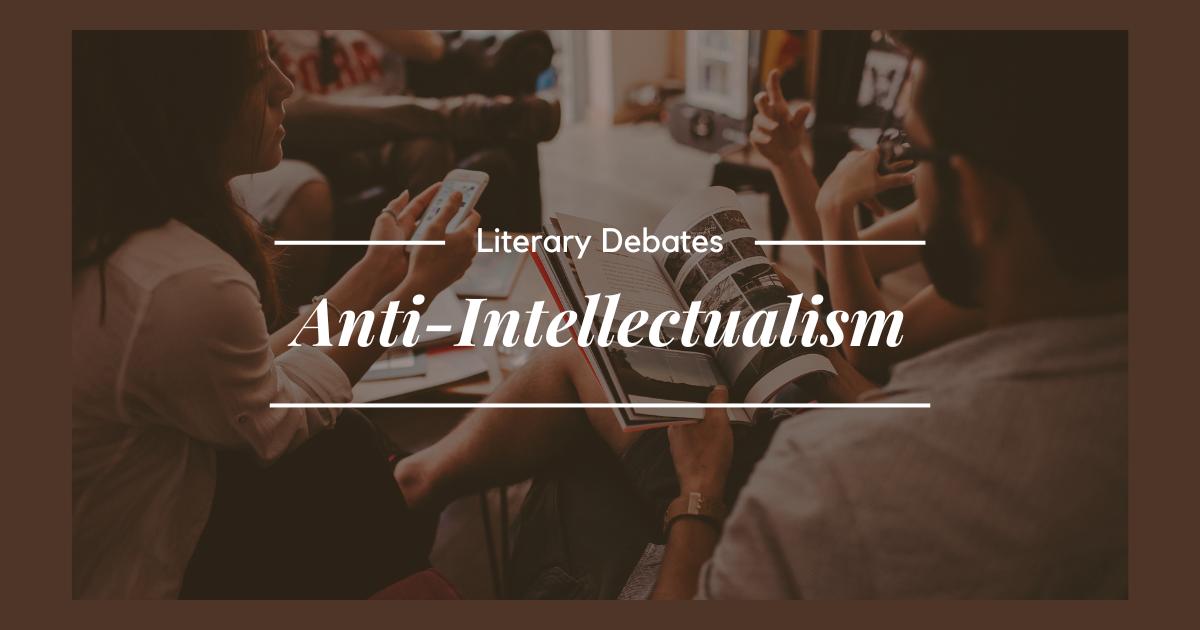If you’re on the book side of TikTok, you might’ve seen this debate floating around about the concept of “anti-intellectualism.” The original creator used this term to describe what she deemed to be a rise in surface-level engagement with reading, to the detriment of deeper analysis.
While I can see why she made this argument, I think it’s a fundamentally flawed view that actually lacks the exact critical thinking she claimed is missing from BookTok.
1. She’s criticizing the wrong thing.
Right out the gate, the first thing she says is that she misses what BookTok was when it was small and just starting up, and how unfortunate it is that it’s become commercialized as it’s gotten bigger. This is a valid viewpoint.
I don’t know this creator’s age, so I can’t speculate over her lived experience with social media, but this is the natural life cycle and eventual death of most social platforms. Many social sites start as a town square, a place to gather and discuss interesting things and find niches. But when businesses, corporations, and influencers discover its marketing potential, it quickly devolves into a corporate hellscape inundated with ads, sponsored content, and extremely surface-level content meant to appeal to “the masses.” Kind of like cable.
But that’s not what she’s critiquing in this video. Rather than an exposé on BookTok’s potential future demise due to commercialization, or the ways in which publishers and marketers need to change, she uses this point to critique readers and fellow reviewers, calling it “anti-intellectualism,” which leads me to point 2.
2. Every platform has a target audience.
After this introduction, she compares two reviews for The Poppy War, one that was more in-depth and one that was a quick blurb. Of course, the one she took issue with was the quick one.
While I understand that she’s mourning what BookTok “used to be” (in her view), I have two issues with this:
- First: what she’s looking for is largely on bookish YouTube and blogs. Many reviewers there use the longer format to deep dive into their book recommendations. TikTok is a platform for short-form content. This is what the viewers are here for – and some likely prefer this kind of brief book recommendation because they’d rather let a book surprise them.
- Wanting TikTok to be something it’s not is a losing battle.
- Second: if you’re not managing your algorithm, your algorithm will manage you. I talk about this more in this blog. But essentially, what she wants does still exist in parts of BookTok.
From there she basically goes on a 1-minute rant about someone calling her pretentious, saying that this “proves her point” about the accuser’s literacy skills. She offers nothing to back this up. This leads me to my next point:
3. Complaining about the way people read and recommend books is pretentious.
This whole position is like going up to a group of people having fun at a bar and saying, “Can’t we just talk about deep things?”
TikTok is not a place for deep thinking. It’s valid if someone wants to experience more of that – which is why, again, one would need to find the right platform. Like YouTube, or long-form blogs.
TikTok is the equivalent of a community dive bar where the surfaces are kind of sticky but the karaoke is entertaining. You go to have fun, laugh with some buddies, and forget your troubles (and try really hard to ignore the constant stream of ads on the TV in the corner). It’s a far cry from a professor’s lectern.
Not to mention, she’s calling it anti-intellectualism as a reference to the negative reaction she gets when she criticizes other creators. But this is misguided. People, in general, tend to respond negatively when they perceive someone as a jerk. Not because they perceive the person as intellectual. Much like if you walked into a dive bar and demanded the patrons discuss philosophical musings; they would blow you off (or punch you, depending).
4. The publishing world is not destroyed by this so-called “anti-intellectualism.”
This was the most dramatic of her claims, which she rallied toward at the end. She posits that the reductive nature of BookTok (aka, recommending a book by a trope, a character, a single plot point, etc) has destroyed the publishing world on the idea that they’re only looking for books with buzzwords.
I barely have the patience to explain why this isn’t true – it certainly doesn’t take much effort to find that quality books are published all the time.
Thinking that pop books and quality literature can’t exist at the same time is like believing that wearing makeup must mean someone is less smart. These things have nothing to do with each other.
This isn’t even a new thing. For example, books with half-naked people on the covers have existed for decades – there has always been a market for cheap, easy-to-produce, fun-to-read books that demand nothing beyond surface-level engagement. Is this worth critiquing on its own? Sure, with the right approach (as in, not accusing readers of anti-intellectualism). But to claim that TikTok, of all things, has done any damage to the publishing world is short-sighted.
I mean, Twilight took over the world and sparked many similar debates long before TikTok was even a seed of an idea in someone’s brain. For reference, the most popular social media site the year the first Twilight movie came out wasn’t Facebook, and it wasn’t even Myspace…it was Blogger. TikTok is just one of many outlets publishers use to do their work, and they always keep up with the times.
(It’s also a reductive argument to boil the entirety of the publishing world down to one social platform, which is ironic since this creator just had a stance against being reductive, but I digress.)
5. Finally, this is the kind of attitude that keeps people from reading.
I don’t know at what point the general view shifted from, “More people should read!” to “Wait, not like that!”
If the goal is to encourage more reading, shouldn’t we be thrilled that more and more non-readers have picked up books because of BookTok?
If the goal is to encourage more reading, shouldn’t we avoid talking smack about someone’s chosen path to the hobby?
It is my view that someone who has something negative to say about how “the masses” engage with books is someone who feels the popularity of reading cheapens it, and since they won’t outright criticize reading, they will instead find fault with the people who are reading.
All that to say: don’t be snobby about a hobby.
Thanks for reading. This blog was written without the assistance of AI.
I would love to have you around! Subscribe below.
Check out some of my other recent blogs:








2 responses to “Anti-Intellectualism: A new way to be pretentious about books”
You made some incredible points. I hate it when people diss each other for their reading tastes and you laid it all out and made compelling arguments beautifully. Great job!
Thanks so much for this comment! I spent a lot of time on this one, I’m glad to know I made my point well. 🙂